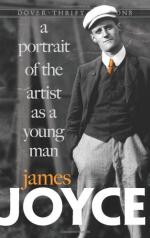The droning voice of the professor continued to wind itself slowly round and round the coils it spoke of, doubling, trebling, quadrupling its somnolent energy as the coil multiplied its ohms of resistance.
Moynihan’s voice called from behind in echo to a distant bell:
—Closing time, gents!
The entrance hall was crowded and loud with talk. On a table near the door were two photographs in frames and between them a long roll of paper bearing an irregular tail of signatures. MacCann went briskly to and fro among the students, talking rapidly, answering rebuffs and leading one after another to the table. In the inner hall the dean of studies stood talking to a young professor, stroking his chin gravely and nodding his head.
Stephen, checked by the crowd at the door, halted irresolutely. From under the wide falling leaf of a soft hat Cranly’s dark eyes were watching him.
—Have you signed? Stephen asked.
Cranly closed his long thin-lipped mouth, communed with himself an instant and answered:
—Ego HABEO.
—What is it for?
—Quod?
—What is it for?
Cranly turned his pale face to Stephen and said blandly and bitterly:
—Per Pax UNIVERSALIS.
Stephen pointed to the Tsar’s photograph and said:
—He has the face of a besotted Christ.
The scorn and anger in his voice brought Cranly’s eyes back from a calm survey of the walls of the hall.
—Are you annoyed? he asked.
—No, answered Stephen.
—Are you in bad humour?
—No.
—Credo UT Vos SANGUINARIUS MENDAX
Estis, said Cranly, QUIA facies
VOSTRA MONSTRAT UT Vos in DAMNO Malo
HUMORE Estis.
Moynihan, on his way to the table, said in Stephen’s ear:
—MacCann is in tiptop form. Ready to shed the last drop. Brand new world. No stimulants and votes for the bitches.
Stephen smiled at the manner of this confidence and, when Moynihan had passed, turned again to meet Cranly’s eyes.
—Perhaps you can tell me, he said, why he pours his soul so freely into my ear. Can you?
A dull scowl appeared on Cranly’s forehead. He stared at the table where Moynihan had bent to write his name on the roll, and then said flatly:
—A sugar!
—QUIS EST in Malo HUMORE, said Stephen, Ego AUT Vos?
Cranly did not take up the taunt. He brooded sourly on his judgement and repeated with the same flat force:
—A flaming bloody sugar, that’s what he is!
It was his epitaph for all dead friendships and Stephen wondered whether it would ever be spoken in the same tone over his memory. The heavy lumpish phrase sank slowly out of hearing like a stone through a quagmire. Stephen saw it sink as he had seen many another, feeling its heaviness depress his heart. Cranly’s speech, unlike that of Davin, had neither rare phrases of Elizabethan English nor quaintly turned versions of Irish idioms. Its drawl was an echo of the quays of Dublin given back by a bleak decaying seaport, its energy an echo of the sacred eloquence of Dublin given back flatly by a Wicklow pulpit.




